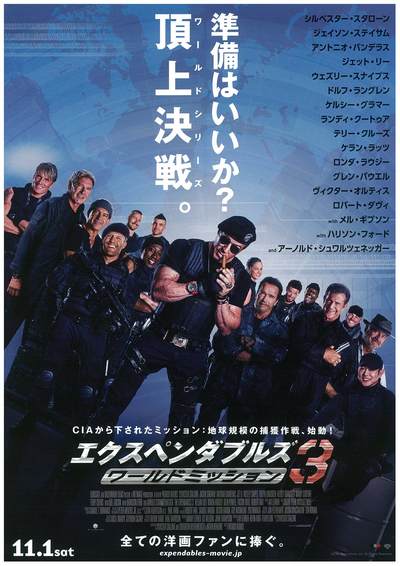Expendables 3: World Series
There are some intriguing features about this Japanese poster for Expendables 3:
Read the rest of this entry »
Zhou Youguang, 109 and going strong
A year ago, I wrote "Zhou Youguang, Father of Pinyin" (1/14/14) to celebrate Zhou xiansheng's 108th birthday and his many accomplishments in language reform and applied linguistics. Included in that post were a portrait of ZYG in his study and numerous links concerning the man and his works.
Read the rest of this entry »
Metaphoric mash-up of the month
Dave Davies, "Clarke out of Philly mayor's race — Butkovitz in?", newsworks 1/13/2015:
Butkovitz made it clear months ago he wanted to run for mayor. He engaged an experienced campaign team, but found it hard to raise money, particularly from unions, as long as there was a chance Clarke might run.
In November, Butkovitz called the whole thing off, said he wasn't running. But he said yesterday Clarke's announcement might change his thinking.
"The phone is ringing off the hook today," he said. "There's a large number of people, contributors, activists, calling up and asking me to get into the race. We're going to have to put a barometer into the water here and figure out what the lay of the land is."
Read the rest of this entry »
Predictable structure in songs, faces, words, & roles
From Gregory "Sir Mashalot" Todd, proof that all Country songs released in 2014 were underlyingly the same:
Read the rest of this entry »
The Word of the Year is a hashtag: #blacklivesmatter
At the American Dialect Society annual conference (held in conjunction with the Linguistic Society of America in Portland, OR), the 2014 Word of the Year was a rather unusual choice: the hashtag #blacklivesmatter. I presided over the voting session (in my capacity as the society's Chair of the New Words Committee). You can read the official announcement here and my recap of Friday night's voting in my Word Routes column for Vocabulary.com here.
Read the rest of this entry »
Stylometric analysis of the Sony Hacking
The question of who was behind the hacking of Sony peaked a couple of weeks ago, but it is still a live issue. The United States government insists that it was the North Koreans who did it:
"Chief Says FBI Has No Doubt That North Korea Attacked Sony" (New York Times — January 8, 2015)
James B. Comey, director of the Federal Bureau of Investigation, said on Wednesday that no one should doubt that the North Korean government was behind the destructive attack on Sony’s computer network last fall.
Read the rest of this entry »
It's hard being loved by jerks
The most tasteful and relevant of the Charlie Hebdo cartoons:
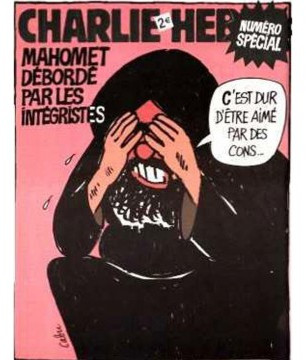
The title "Mahomet débordé par les intégristes" means "Muhammad overwhelmed by the fundamentalists"; and the speech balloon "C'est dur d'être aimé par des cons" means "It's hard being loved by jerks", a thought that must also occasionally have occurred to Moses, Jesus, Buddha, and others.
Read the rest of this entry »
Why definiteness is decreasing, part 2
In an earlier post on this topic ("Why definiteness is decreasing, part 1"), I suggested that the decrease in definite-article frequency in published English text, over the course of the past century, might be connected with a decrease in formality. Roughly, this means that writing has been becoming more like speech (though speech has also been changing, and writing and speech remain very different).
 In this post, I want to discuss two other socio-stylistic dimensions — age and sex. If the language is changing, then we expect to see "age grading", where younger people tend to exhibit the innovative pattern, while older people's usage is more old-fashioned. And because women are generally the leaders in language change, we expect to see women at every age being more linguistically innovative and men being more conservative. In other words, "young men talk like old women". And as the plot on the right illustrates, differences by age and sex in the frequency of the seem to confirm this hypothesis. (Click on the graph for a larger version.)
In this post, I want to discuss two other socio-stylistic dimensions — age and sex. If the language is changing, then we expect to see "age grading", where younger people tend to exhibit the innovative pattern, while older people's usage is more old-fashioned. And because women are generally the leaders in language change, we expect to see women at every age being more linguistically innovative and men being more conservative. In other words, "young men talk like old women". And as the plot on the right illustrates, differences by age and sex in the frequency of the seem to confirm this hypothesis. (Click on the graph for a larger version.)
Read the rest of this entry »
Nous sommes Charlie
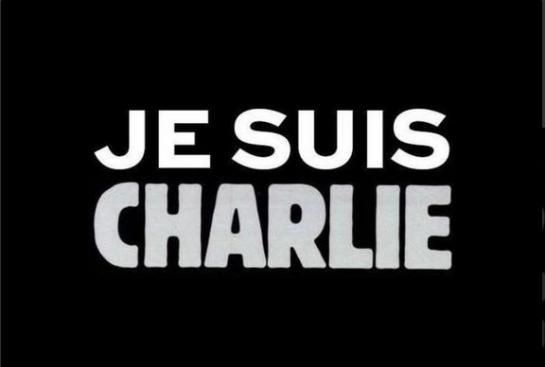 Should publishing a cartoon representation of the prophet Mohammed be punishable by death?
Should publishing a cartoon representation of the prophet Mohammed be punishable by death?
After the massacre of magazine staff by lunatic Islamist murderers that took place in Paris two days ago, many who think the answer is "No" have begun displaying buttons or placards saying Je suis Charlie. I'd wear one myself if I could get one.
Read the rest of this entry »
Permalink Comments off
Why definiteness is decreasing, part 1
I ended yesterday's post ("Decreasing Definiteness") with a promise to say more about why the frequency of the has decreased so much over the past century or so, and this morning's post will start to redeem that promise.
As several commenters observed, there are probably several different things going on here. But I think that one relevant factor is decreasing formality of style.
I'll leave for another day the question of what formality really is, and why a decrease in formality correlates with a decrease in the frequency of the. In this post, I'll try to establish two simpler points:
- In English text that's more formal, in common-sense terms, the is more common;
- The formality of (various genres of) English writing has been decreasing over the past century or so.
Read the rest of this entry »
Decreasing definiteness
During the course of the 20th century, the frequency of the English definite article the decreased gradually and radically. I first noticed this effect about a year ago, in a post about the history of State of the Union addresses ("SOTU evolution", 1/26/2014), where I observed, in reference to the graph on the right, that
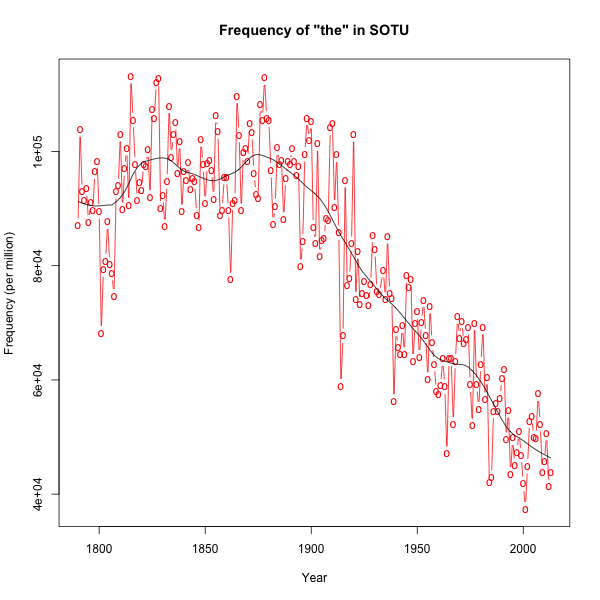 The average frequency of the in the most recent 10 SOTU addresses (2004-2013) was 47,458 per million words; in the first 10 addresses (1790-1799, all delivered as speeches to Congress) it was 93,201 per million words, almost double the frequency. And the decline during the 20th-century era of oral addresses seems to have been a gradual one.
The average frequency of the in the most recent 10 SOTU addresses (2004-2013) was 47,458 per million words; in the first 10 addresses (1790-1799, all delivered as speeches to Congress) it was 93,201 per million words, almost double the frequency. And the decline during the 20th-century era of oral addresses seems to have been a gradual one.
I speculated that
Maybe the style of speeches has been getting gradually less formal, and therefore gradually less like written style. Or maybe even formal styles have been changing.
And I noted that a corresponding effect can be seen in two other sources, the BYU Corpus of Historical American English (COHA) and the Google Books N-Gram viewer (GNG), though it is considerably smaller in magnitude:
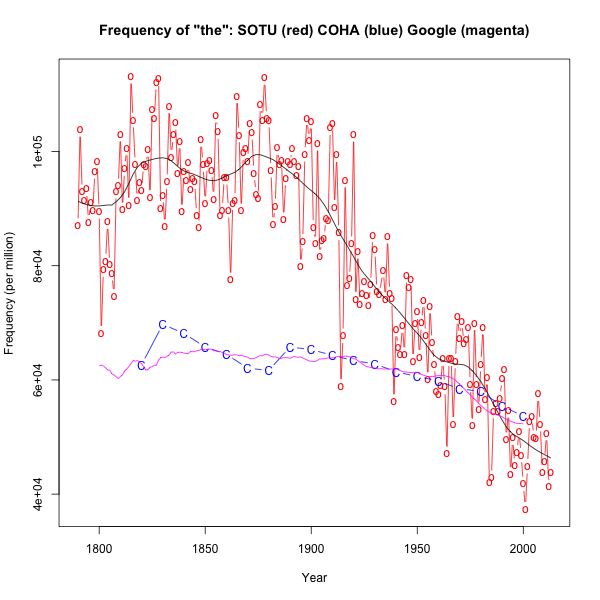 COHA and the Google Books data pretty much agree, which is reassuring; and they both suggest a slight decline in the frequency of the; but the change that they show is very modest compared to the change in SOTU frequencies. So I feel that the explanation for the SOTU change remains to be found.
COHA and the Google Books data pretty much agree, which is reassuring; and they both suggest a slight decline in the frequency of the; but the change that they show is very modest compared to the change in SOTU frequencies. So I feel that the explanation for the SOTU change remains to be found.
At that point, I turned my attention to other aspects of SOTU evolution. But a student paper recently reminded me of this issue.
Read the rest of this entry »
